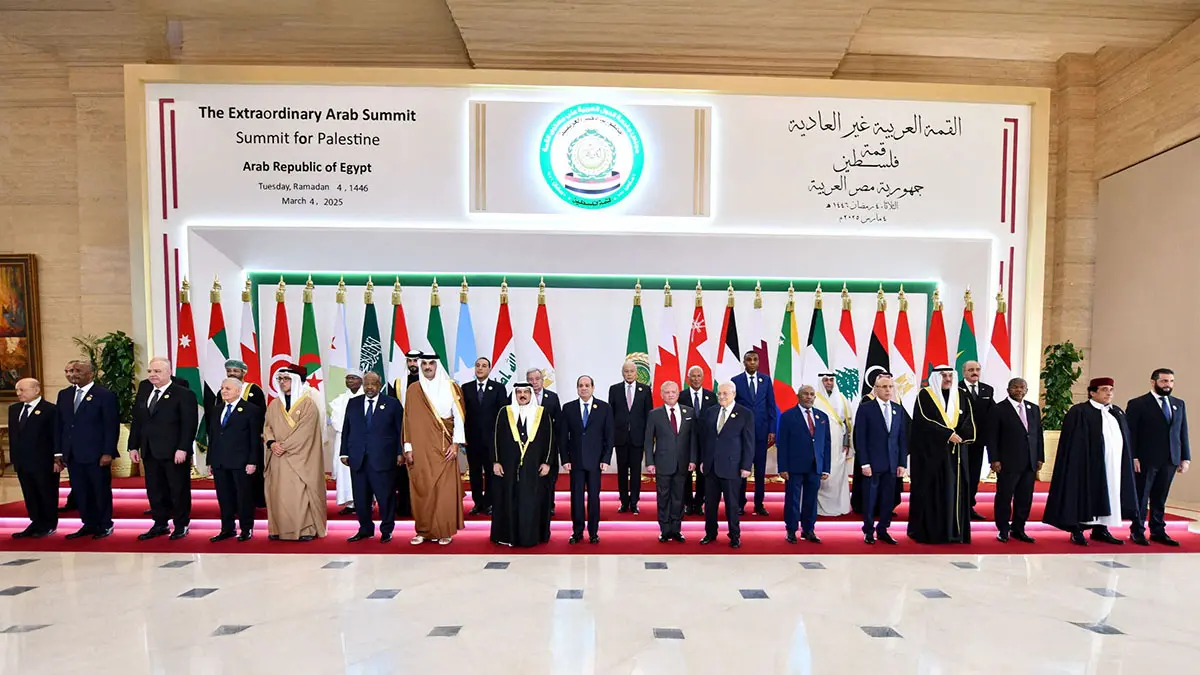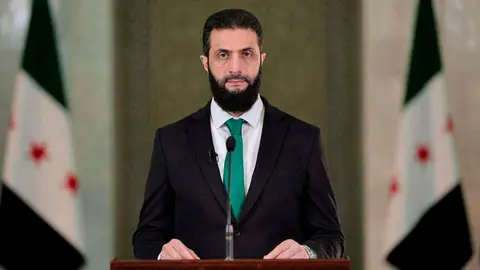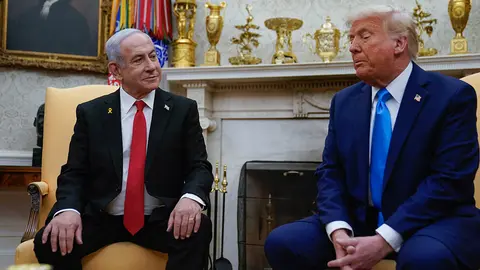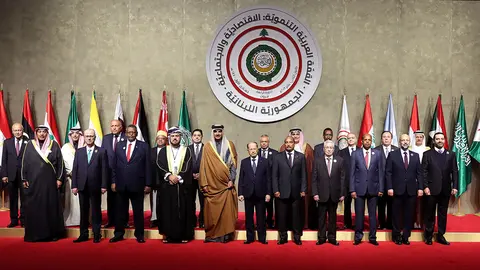The Extraordinary Arab Summit in Cairo approves Egypt's plan for the recovery and reconstruction of Gaza

- Broad consensus
- International Support
- Indifference towards Hamas and a rearmament
- Abbas willing to hold elections in Gaza in 2025
- The Gaza reconstruction plan
The President of Egypt, Abdel Fattah Al-Sisi, and the Secretary General of the Arab League, Ahmed Aboul Gheit, announced at the Extraordinary Arab Summit the approval of the plan presented by Egypt, in coordination with the Palestinian State and the Arab countries, and under the supervision of the World Bank and the United Nations Development Programme, for the reconstruction of Gaza and the recovery of the social, political and economic stability of the Palestinian enclave.

This proposal from Al-Sisi is a firm response to the idea put forward by Donald Trump about the construction of the ‘Middle East Riviera’ and the expulsion of the Palestinian population to Egypt and Jordan. ‘I express my sincere gratitude and great appreciation for your sincere efforts, your vision and your valuable support,’ Al-Sisi said.
Furthermore, for both the Syrian president, Ahmed Al-Sharaa, and the Lebanese president, Joseph Aoun, the Extraordinary Arab Summit was the first meeting they had attended.
Broad consensus
In the ‘Cairo Declaration’ Arab leaders urged the international community and financial institutions to urgently provide guarantees and support for the reconstruction plan for the Gaza Strip. The plan emphasises that these efforts must go hand in hand with a political process that proposes stability as a basis and guarantees the legitimate aspirations of the Palestinian people.

In response to the resolution, the King of Bahrain, Hamad bin Isa Al-Khalifa, affirmed the right of the Palestinian people to self-determination and to the establishment of an independent state and rejected any proposal for expulsion. Along the same lines, Ahmed Aboul Gheit pointed out that the creation of two states is the only way towards ‘true peace.’
In his first participation in the Arab Summit, Lebanese President Joseph Aoun confirmed: ‘We will not give up our land, we will not abandon our prisoners, and there will be no peace without liberating the last inch of our land.’
‘Lebanon taught me first that Palestine is a just cause, and justice always needs strength, and strength in the struggles of the people is the strength of logic, the strength of position, the strength to convince the world, the strength to mobilise the support of public opinion and the strength of the overall balance of power. Lebanon taught me, secondly, that Palestine is a trinitarian question: it is a Palestinian national right, an Arab national right and a universal human right.’

The King of Jordan, Abdullah II, confirmed his support for the Egyptian plan to rebuild the Strip. “At this critical stage, when the Palestinian cause faces very serious challenges, we must work together,” he said.
‘Maintaining the ceasefire is urgent to be able to face any attempt at a solution to the conflict. From here I want to express my strongest rejection of all attempts to displace the Palestinians in the West Bank and Gaza and to annex land, which constitute a flagrant violation of international law and international humanitarian law,’ Abdullah II.
Representing Morocco, Nasser Bourita, Minister of Foreign Affairs, pointed out that the Alaouite country has maintained constant support for the Palestinian cause during the Israeli conflict in Gaza, which has claimed more than 60,000 lives.
The minister also reaffirmed the commitment of the King of Morocco, Mohammed VI, to support the preservation of the historical and legal status of the Holy City as a place of coexistence and to support the resilience of its inhabitants. Bourita also stressed the importance of not neglecting the situation in the West Bank and Jerusalem.

International Support
In contrast, Antonio Guterres, Secretary General of the United Nations, prioritised the suffering of the Palestinian population in his statements. He also called for the ceasefire plans to be respected and for both the hostages and the Palestinian prisoners to be released to end the conflict as soon as possible.
In the same vein, Antonio Costa, President of the European Council, said that Europe is ‘fully committed to the two-state solution and will provide concrete support to the Arab initiative.’ Costa also insisted that the European Union rejects the expulsion and displacement of the Palestinian population. ‘The EU is ready to contribute to this important endeavour. Egypt can count on our support,’ he concluded in a post on X.

Finally, Sheikh Sabah Khaled Al-Hamad Al-Sabah, crown prince of Kuwait, stated that ‘the displacement of the Palestinian people is not realistic and represents a crime of ethnic cleansing’; and the Saudi Arabian foreign minister, Prince Faisal bin Farhan, stated that his country will reject any attempt to displace the Palestinian population and will give its full support to the reconstruction of the Gaza Strip.
Indifference towards Hamas and a rearmament
However, the plan proposed by Egypt has not considered one of the main players during the conflict: Hamas. This has been one of the premises that Israel would have criticised after the declaration of the Reconstruction Plan for the Strip was issued.
Specifically, Israel has stated that ‘as long as Hamas is excluded from the Strip, it would support an Arab administration in the enclave and the West Bank.’ However, Israel's Foreign Minister, Gideon Saar, criticised the fact that the final declaration of the Summit did not address the reality of the situation with Hamas.

The absence of Hamas at the Summit may be a fatal error given that the terrorist organisation that started the conflict with the attacks of 7 October continues to have a great deal of power in the Palestinian enclave, and therefore a possible reconstruction without the total disarmament of Hamas could lead to a civil war within the territory that maintains the instability and prolongs the conflict, which would result in a total failure of the reconstruction plan.
Abbas willing to hold elections in Gaza in 2025
To regain his legitimacy, the President of the Palestinian Authority, Mahmoud Abbas, has declared at the Summit that he is willing to hold presidential and legislative elections in 2025 ‘if conditions are favourable’. Abbas emphasised that the Palestinian Authority must be the only legitimate armed force in Gaza and the West Bank, a fact that has been categorically denied by Hamas, the organisation that has controlled the Strip since 2007.

Since the conflict began on 7 October 2023, sources close to Hamas have indicated that the organisation still has thousands of soldiers in its ranks, despite the weakening caused by the special operations against the organisation's leaders by the Israel Defence Forces.
In response to Abbas' proposal, the Egyptian president suggested the creation of a committee of Palestinian scholars to manage the enclave for a time, thus paving the way for the Palestinian Authority to hold future elections.
The Gaza reconstruction plan
Converting the Gaza Strip will cost more than 53 billion dollars until 2030, when the three phases that make up the plan are expected to be completed. The Arab Plan for the Reconstruction of Gaza aims to achieve the long-term sustainable development of the Palestinian enclave.

The Plan, with an architectural base based on Palestinian tradition, will offer the Strip an integrated urban environment based on optimal land use and a balanced distribution of urban and economic activities; in addition to improving local and international connections through the development of transport infrastructures and a road network that includes ports and a proper logistical infrastructure to support trade and investment.
The Plan seeks to create large residential areas, economic and development zones, urban and service centres, tourist and recreational areas, agricultural and rural areas, and central services. Specifically, 6 hospitals with a capacity for 300 beds, 5 universities, 15 shopping centres, 200 mosques, 15 police centres, 10 cultural centres and 5 sports clubs will be created.

The first phase of the Plan will involve the removal of rubble, ‘transporting the waste to coastal collection sites,’ and the provision of 200,000 temporary housing units. It will last six months and cost approximately $3 billion.
In the second phase, more than 60,000 homes will be rebuilt and repaired, and 90,000 hectares will be rehabilitated for agricultural use. This phase will last two years and will cost 20 billion dollars.

Finally, the third phase, which will last more than two and a half years and cost more than 30 billion dollars, will focus on the development of infrastructure and service facilities, the construction of 200,000 permanent homes, and the construction of an international airport and two ports.











